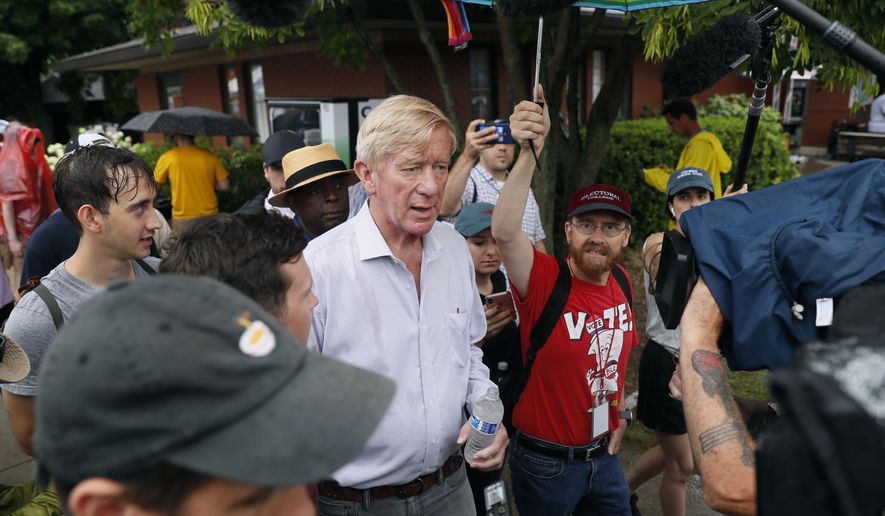OPINION:
One of the questions in Philosophy 101 that leaves collegians scratching their chins asks: “If a tree falls in the woods, and there’s no one there to hear it, did it make a sound?”
As it applies to presidential politics, the demise of coffee magnate Howard Schultz’s independent presidential campaign was marked by the political equivalent of sylvan silence.
Few noticed on Sept. 6 when the Schultz for President campaign fell like so much deadwood in the forest. If it was heard at all, it was a whimper, not a bang. Howard, we hardly knew ye.
That was in stark contrast to the fanfare that greeted the former Starbucks CEO when he announced his still-prospective third-party candidacy back in January on CBS’ “60 Minutes.”
The Schultz candidacy, which for all practical purposes died aborning, was predicated on there being a large, moderate plurality of voters who would be receptive to an alternative to the two major parties, which are moving increasingly to their ideological bases.
That’s especially true of the Democrats, whose presidential hopefuls in their monthly debates are falling all over one another to see who can scramble furthest and fastest to the far left.
But belying Mr. Schultz’s assertion that he was trying to provide voters with a “moderate” alternative to the two major parties, he made it clear he was ending his campaign out of mortal dread that his third-party candidacy would only ensure President Trump’s re-election.
“Trump must not serve a second term,” Mr. Schultz harrumphed. “No one wants Donald Trump fired more than I.”
Mr. Schultz apparently has no comparable qualms about the prospect of the election of a far-left Democrat as president, because there were certainly no “moderates” on the debate stage in Houston on Sept. 12.
The barista-in-chief bowed both to political reality and to Democrats’ demands that he drop out of the race for fear of siphoning off votes of registered Democrats who don’t like Mr. Trump, but also don’t like any of the Democrats running.
Had Mr. Schultz been genuinely interested in offering himself up as a moderating force in presidential politics, after ending his independent bid, he could have jumped into the Democratic field.
There’s still time for him to do so before the next Democratic debate on Oct. 15.
Meanwhile, anti-Trump Republican presidential wannabes former Massachusetts Gov. Bill Weld and former Reps. Mark Sanford of South Carolina and Joe Walsh of Illinois would do well to follow Mr. Schultz onto the sidelines, albeit for the opposite reason.
With polls of Republican voters showing Mr. Trump with 80-plus percent job approval, there’s less-than-zero chance of any of them depriving him of the Republican presidential nomination.
“They are all at less than 1 percent. I guess it’s a publicity stunt,” Mr. Trump said of his would-be intraparty rivals. “They have no credibility.” To call them “the Three Stooges,” as the president has, is an insult to Moe, Larry and Curly (and to Shemp, too).
The poll numbers likely explain why state Republican parties in Arizona, Kansas, Nevada and South Carolina have scrapped plans for GOP primaries or caucuses next year as a waste of money.
But in a joint Sept. 15 op-ed column in The Washington Post, Messrs. Weld, Sanford and Walsh hyperbolically decried the move. “Do Republicans really want to be the party with a nominating process that more resembles Russia or China than our American tradition?” they wrote.
The trio concluded the piece by holding out the threat of “legal challenges” to compel the four states to stage nominating contests, but other states may yet follow their lead, because there’s ample precedent over the past 35 years of both parties canceling primaries and caucuses when presidential incumbents up for re-election had token opposition.
Canceling the primaries is also not unlike how the Democratic National Committee effectively cut the party’s presidential field in half, from 20 to 10, by raising the thresholds in polling and campaign contributions to qualify for participating in their debates.
If any of the three Republican renegades were to run as independents or carrying the Libertarian Party banner, the only purpose such a vanity candidacy could possibly serve would be to help elect the Democratic nominee.
Do these anti-Trump (and in Mr. Weld’s case, RINO) Republicans really want their epitaphs to read that they were responsible for putting, say, Sens. Bernie Sanders, Vermont independent, or Elizabeth Warren, Massachusetts Democrat, behind the Resolute Desk in the Oval Office, with all that that augurs?
Like that tree that fell in the woods, none of them is exactly presidential timber anyway, and when their candidacies fall by the wayside like Mr. Schultz’s, almost no one will hear, and even fewer will care.




Please read our comment policy before commenting.